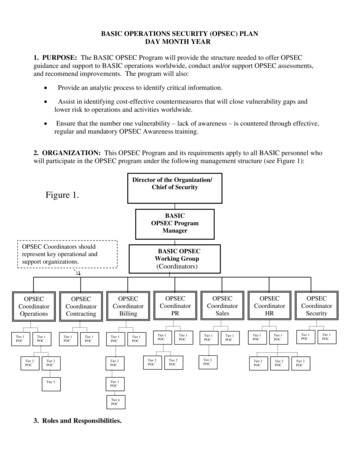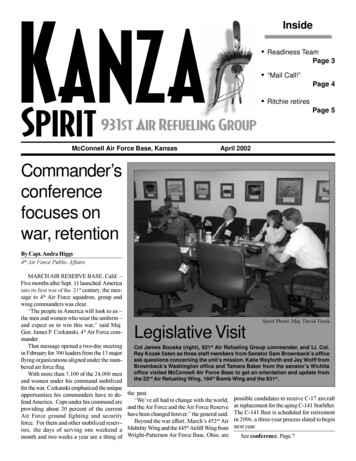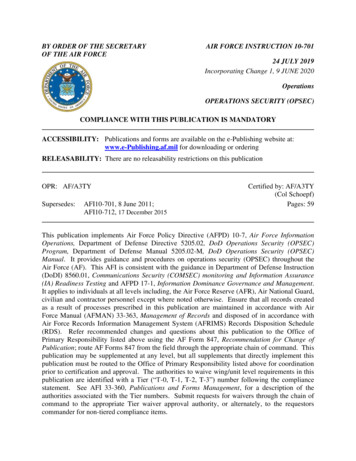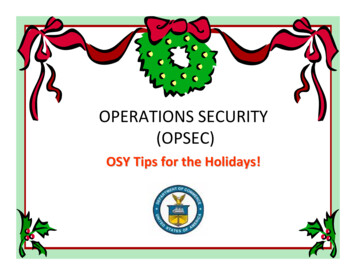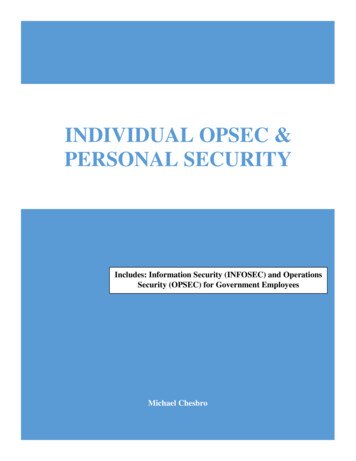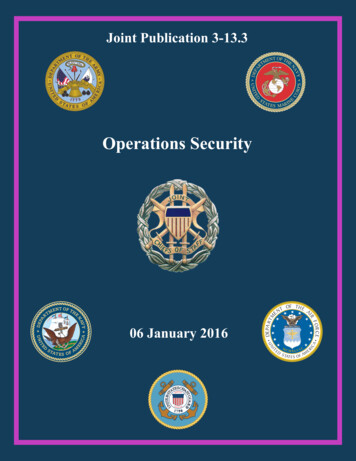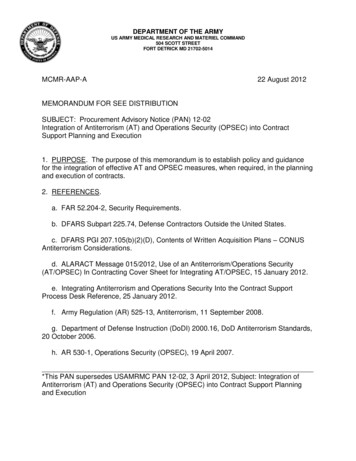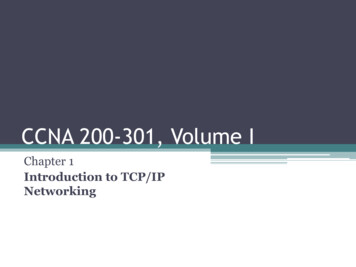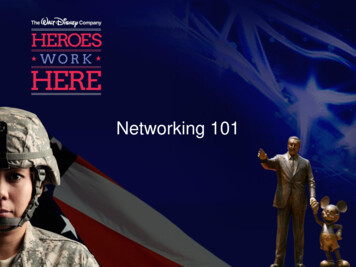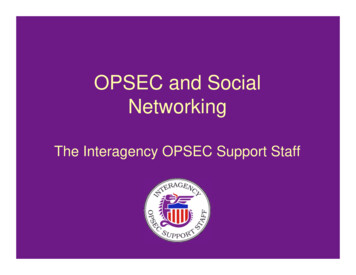
Transcription
OPSEC and SocialNetworkingThe Interagency OPSEC Support Staff
What is a Social Networking Site?Social Networking Sites (SNS) allow peopleto collaborate and connect to shareinformation and ideas.
Why use an SNS?Personally- Fun, exciting, entertaining, useful formaintaining relationshipsProfessionally- Marketing, manage public image,connect with customers, solicit ideas andfeedback.
The DangerBad guys use it, too: Stalkers Thieves Hackers Phishers/Scammers Enemy organizations Pedophiles Etc.
For Example:From the headlines“Doh! Senior U.S. politician blunders byblogging about secret trip to Iraq . while inthe country” - Daily Mail Reporter“Could Twitter robbers get to you?” – NBC“Twitter gets you fired in 140 characters or less” –MSNBC“MySpace Evicts 90,000 Sex Offenders” – ABCNews“Pennsylvania Man Charged With Using MySpaceAccount to Drug, Rape Teen Girl” – Fox News
Terrorists, Too“Information about government personnel,officers, important personalities, and allmatters related to those (resident, workplace, times of leaving and returning,wives and children, places visited).”- the Al Qaeda handbook
Critical Information What you want to keep from them What they want from youThese are not always the same list. Knowyour adversary to learn their goals andwhat’s important to them.
Critical InformationThings You Should NOT Share on SNS Names and photos ofyou, your family andco-workers Usernames,passwords, networkdetails Job title, location,salary, clearances Physical security andlogistics Mission capabilitiesand limitations Schedules and travelitineraries Social securitynumber, credit cards,banking information Hobbies, likes,dislikes, etc.
“Do’s”Remember Computer SecurityAn adversary won’t waste time on the“human factor” if they can go after thecomputer system directly. Hacking Theft Planted code
“Do’s”Consider All the PlayersBefore posting data to an SNS, ask: Who owns the company? Who are their partners? Where are they hosted? Who has access to the data?Some might be adversaries or affiliated.
“Do’s”Modify Your Search ProfileSearch profile: the data about you that isvisible when someone is searching for“friends”What might be publicly visibleeven if your profile isn’t: Name Photo List of networks and groups List of friends Age/ Sex/ Location
“Do’s”Reasonable SuspicionSocial engineering and “conning” start withbecoming a friend.They: Like what you like Hate what you hate Understand youBe especially cautious about dating sites
“Do’s”Verify Supposed “Real” FriendsOld Jimmy Smith from the high school swimteam OR adversary?They can get the data from: Yearbooks Other SNSs Your posts/profileVERIFY BEFORE ADDING!
“Do’s”Watch Your FriendsYou didn’t post sensitive pictures of you andyour kids, but your brother, wife, mother,or friend did.
“Do’s”Treat Links and Files CarefullyWould you follow a link in e-mail? Would youdownload and run an attachment? Thenwhy do you do these things on SNSs?Verify before acting!
“Do’s”Question the Utility of an SNS Do you really have a purpose for using anSNS, or do you use it “just because” Are you very careful with the data andunderstand data aggregation issues? Are you willing to find and learn all thesecurity controls and keep up with them asthey change?Do you really need the risk of an SNS?
“Don’ts”Don’t Discuss work Assume the adversarywill find you and read whatyou post. Search engines makeit easy. Poor security makesit possible.
“Don’ts”Don’t Use the Same Passwords To use only one password for everythingis to hand your life to the first bad guy thatworks at any webservice you register with.
“Don’ts”Don’t Give Away PasswordsThen Schmidt came to a page saying that "we'll find yourfriends and family who are already members and alsoautomatically invite any nonmembers to join (it's free!)."It instructed her to enter the password for her Yahooe-mail account."I thought I was just signing up to read my friend'smessage," Schmidt said. "At no time did I think I wasauthorizing them to access my online address book."David LazerusLos Angeles TimesApril 16, 2008
“Don’ts”Don’t Give Away PasswordsNever give away a password toany account to anyone EVER!!!This should be a life rule, for everythingyou do, not just SNS.
“Don’ts”Don’t Use Unsecured Logon at Public HotspotsMost SNSs do NOT have a secure logincapability. Remember that when usingthemLockhttps
“Don’ts”Don’t Depend on the SNS for SecurityBut it’s private right? Hackers Incorrect or incomplete settings Sharing data with “partners” Sale of data during bankruptcy
“Don’ts”Don’t Trust Add-Ons Plugins, Games, Applications –– written by Who Knows– and does Who Knows What.The SNS didn’t make the application,someone else did. Do you know who?What their motives are? What they putin the code?
“Don’ts”Don’t Be Too Generous with Permissions Create groups (such as “poker club”,“co-workers”, “family”) -- organizefriends based on the access you wantthem to have.– Set permissions for: Your status, photos, postings etc
“Don’ts”Don’t Post Personal InformationReal friends already know your homeaddress, phone number, etc. Don’tbroadcast that to strangers.
“Don’ts”Don’t Post What the Public Can’t KnowNo matter what, things you post mightspread. If you’re not comfortable with itbeing public knowledge, don’t post it.
Remember to think twice before providinginformation and follow the motto“Better Safe than Sorry”For further information.Please contact the DoDEA OPSEC officeratsafetyandsecurityoffice@hq.dodea.edu
OPSEC and Social Networking The Interagency OPSEC Support Staff . . Social Networking Sites (SNS) allow people to collaborate and connect to share information and ideas. Why use an SNS? Personally - Fun, exciting, entertaining, useful for maintaining relationships Professionally
